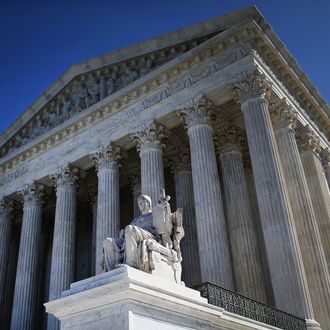
It’s hasn’t been a particularly good decade for voting rights, to say the least. But there are limits to what conservative opponents of minority representation can get away with, as the U.S. Supreme Court demonstrated in a unanimous rejection of the claim that only actual voters should count in creating equally populated districts.
In Evenwel v. Abbott, conservative activists argued that the number of actual voters, not total population, should be considered for the purposes of determining equal representation in drawing districts for legislative bodies, as a matter of constitutional law. A lower court in Texas disagreed, and SCOTUS decided to take the appeal, apparently to set some limits for this kind of claim.
Writing for a six-justice majority (with Thomas and Alito concurring), Justice Ginsburg explored the history of the one-person-one-vote principle and concluded emphatically that precedents overwhelmingly favored the use of total population in providing for equal representation. Rick Hasen at Election Law Blog provided a clear summary:
Justice Ginsburg’s opinion holds that districting using total population was consistent with constitutional history, the Court’s own decisions, and longstanding practice …
In key language, she writes that “Nonvoters have an important stake in many policy debates—children, their parents, even their grandparents, for example, have a stake in a strong public-education system—and in receiving constituent services, such as help navigating public-benefits bureaucracies. By ensuring that each representative is subject to requests and suggestions from the same number of constituents, total population apportionment promotes equitable and effective representation.”
From the point of view of setting a new precedent, Ginsburg made it clear (and, again, was supported in this by the chief justice and by Justice Kennedy) that Texas and other states should not conclude they have the option of moving to a voters-only standard for representation. Thomas and Alito think otherwise but are significantly outgunned on this point.
All in all, it’s a comforting decision for voting-rights traditionalists, though the case itself is a reminder of the very radical thinking of some in the conservative legal movement.






























